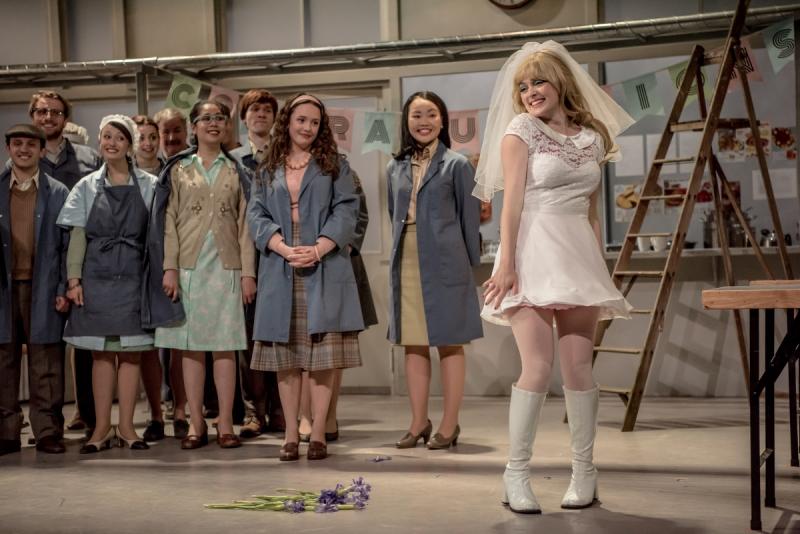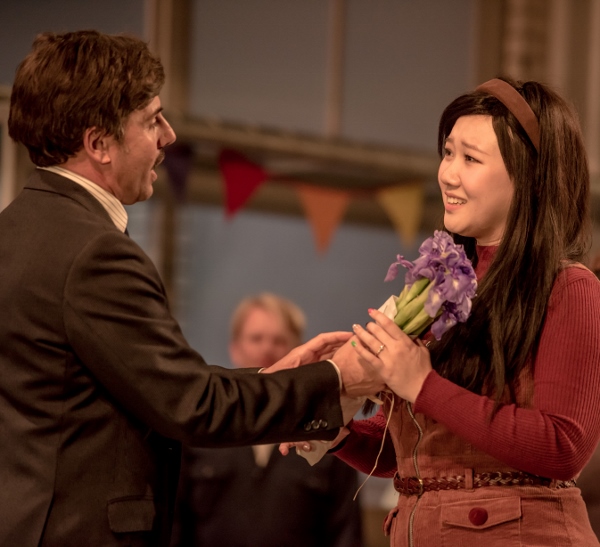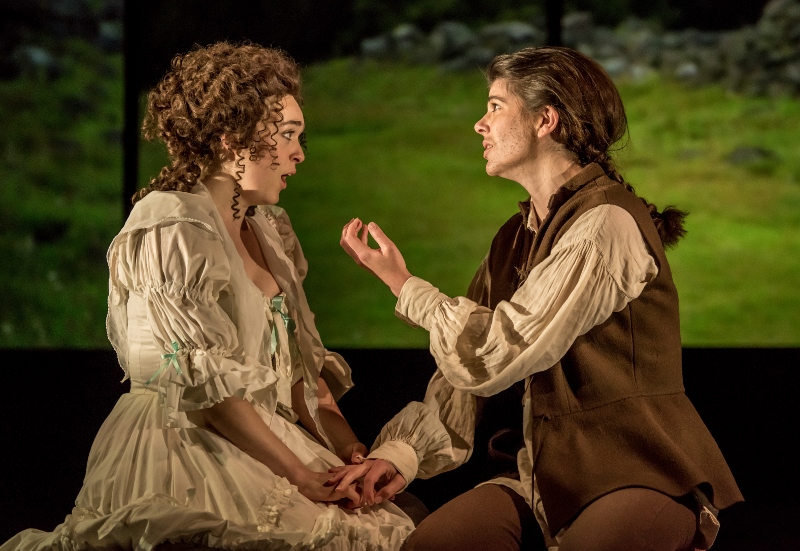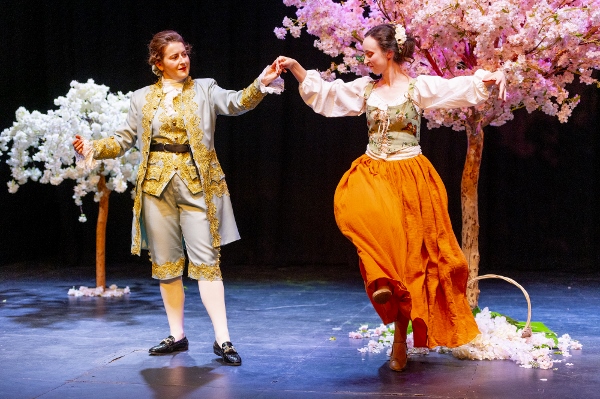theartsdesk at the Buxton International Festival - bel canto in the High Peak | reviews, news & interviews
theartsdesk at the Buxton International Festival - bel canto in the High Peak
theartsdesk at the Buxton International Festival - bel canto in the High Peak
Re-thought story in Bellini comedy is the festival highspot

Bellini’s La Sonnambula is the highspot of a four-show lyric theatre bill at the Buxton International Festival this year, and demonstrates again how beautifully suited the small Matcham opera house in the High Peak is to mid-19th century bel canto repertoire.
Given that the acoustics are so good, and what really matters is to get a good team of voices and a conductor of real musicianship in the pit – both of which they have here – it might have been tempting to skimp on the production values. Times are still tough when it comes to festival-style opera, and there are signs that in some aspects the festival is being very careful with its cash (it always has been, which is why it’s survived).
But, back with Bellini, whose last showing at the festival was I Capuleti e i Montecchi in 2016, they’ve also returned to the director with a sure touch on that occasion – Harry Fehr – and given him a gifted design team in Nicky Shaw (set) and Zahra Mansouri (costumes). He’s re-thought the comedy’s scenario, of course: no longer in a Swiss country village, it’s much more local, and set, I would say, in the 1960s or soon after.
It's set in a works canteen, probably in or near Buxton. Elvino (Nico Darmanin) is the fanciable young boss; Lisa the blousy girl behind the counter he once dallied with, and Amina the rather more high-minded damsel he’s set to marry at the start. We see a nicely constructed dining area (using all the Buxton stage space), with a counter and the kitchen behind it. A remarkably quick change for scene two converts this to a bedroom, provided for Rodolfo (Simon Shibambu), the surprise hill walker who joins the staff’s celebratory moment, having misread his Ordnance Survey map. That’s where the first sleepwalking happens, as in the original, and all that’s needed then is to revert to the canteen to carry the rest of the plot.
 Although Amina (Ziyi Dai, pictured right with Nico Darmanin) has the lion’s share of the vocal pyrotechnics in the score, Lisa (Ellie Neate) becomes the lynchpin of the revised storyline. She’s very much a Sixties girl, eagerly dropping her knickers (rather than a handkerchief) as soon as she’s in private with Rodolfo – which of course proves her ultimate undoing even after Elvino has dumped Amina and switched his affections to her because everyone thinks Amina, found in Rodolfo’s bed, must have been in it with him.
Although Amina (Ziyi Dai, pictured right with Nico Darmanin) has the lion’s share of the vocal pyrotechnics in the score, Lisa (Ellie Neate) becomes the lynchpin of the revised storyline. She’s very much a Sixties girl, eagerly dropping her knickers (rather than a handkerchief) as soon as she’s in private with Rodolfo – which of course proves her ultimate undoing even after Elvino has dumped Amina and switched his affections to her because everyone thinks Amina, found in Rodolfo’s bed, must have been in it with him.
Fehr makes excellent use of the BIF chorus, which is composed half of “Young Artists” to manage an effective muster of 20 – they do a neat little comic movement sequence, twice over, to greet the successive prospective brides, and are cleverly directed throughout, – and has a trick up his sleeve for the happy ending, which I won’t reveal, but it’s good fun even if a tad surreal.
It's still down to the principals to deliver in bel canto, of course, and they do. Ziyi Dai’s control of line and mastery of coloratura were apparent from the start in “Come per me sereno” and its joyful cabaletta, and the big “sleepwalking” aria near the end, “Ah! non credea mirarti”, was rich in tone and well timed and sustained. She can also top the climactic ensembles superbly.
Nico Darmanin (heard last year in Rossini’s La Donna del Lago at Buxton and more recently with Opera North and elsewhere) was again on form with the high notes, and full of passion, whether of love or betrayal, from the tenderness of the first act duet to the repentance of the finale. Simon Shibambu brings a mellow sustained quality to his role, first heard in his “Vi ravviso” cavatina; Ann Taylor is good as ever as Teresa, Amina’s adoptive mother.
Ellie Neate, though, has a different voice quality from her love rival, varied and incisive, which gives her characterization musical distinction, combining with her comic acting skill. She has her big vocal moment near the end and carries it off with aplomb, dressing herself at the same time.
Adrian Kelly, festival artistic director, conducts with enormous skill, choosing his tempi carefully and with variety, so the alternation of slow and fast in the double arias is never plod-and-gallop, and drawing out the best from all the singers, while the Northern Chamber Orchestra play beautifully for him. The chorus sound magnificent (chorusmaster, Paul Plummer).
So that’s the best show of the festival without a doubt. The other operatic in-house production is small-scale, though done with equal care and expertise – it’s Mozart’s early serenata, Il Re Pastore.
 The five-strong cast again boasts Ellie Neate performing delightfully in a key role, making this year’s festival very much her showcase. She is Elise, the shepherdess with whom Aminta, the trousered title-role sung by Katie Coventry, is in love (both pictured left). Alessandro, aka Alexander the Great (Joseph Doody) has deposed a tyrant and seeks the rightful heir to the throne, who is Aminta, though unbeknown to all at first. The tyrant’s daughter Tamiri (Olivia Carrell) is also in hiding as a shepherdess, and loves Agenore (George Curnow), Alessandro’s right-hand man, who knows her secret. Alessandro, when he discovers who Aminta really is, puts his foot in it by proposing a political marriage of convenience between Aminta and Tamiri, but love triumphs in the end.
The five-strong cast again boasts Ellie Neate performing delightfully in a key role, making this year’s festival very much her showcase. She is Elise, the shepherdess with whom Aminta, the trousered title-role sung by Katie Coventry, is in love (both pictured left). Alessandro, aka Alexander the Great (Joseph Doody) has deposed a tyrant and seeks the rightful heir to the throne, who is Aminta, though unbeknown to all at first. The tyrant’s daughter Tamiri (Olivia Carrell) is also in hiding as a shepherdess, and loves Agenore (George Curnow), Alessandro’s right-hand man, who knows her secret. Alessandro, when he discovers who Aminta really is, puts his foot in it by proposing a political marriage of convenience between Aminta and Tamiri, but love triumphs in the end.
Mozart wrote this in formal vein, with da capo arias and cadential display points, so it needs real vocal stylists and they must be agile enough to skip through the often demanding lines and lively tempi that give the piece its attraction. He also provided two arias that point to future glories and stand out from the more conventional pastoral stuff of the remainder: they are Elise’s “Barbaro!” (to Agenore, when he tells her she must give up her beloved), and Aminta’s final love song for Elise, “L'amerò, sarò costante”,with the baroque tones of oboi d'amore in the orchestra and a violin solo creating a gorgeous instrumental tapestry (and a final accompanied cadenza).
Those were delivered with passion and resource by Ellie Neate and Katie Coventry, Adrian Kelly again providing rich resource and excellent direction from the pit.
Jack Furness directs: designer Hannah Wolfe confines herself to some in-period colourful costumes – military for Alessandro, court dress for Agenore, rustic for Aminta, Elise and Tamiri (though the girls seem to follow the Marie Antoinette school of how to be a shepherdess), and finally a splendid big wig and big hat for the restored-to-royal Tamiri.
There’s no stage set as such, but Furness provides his own video photography for projection at the back, so we see plenty of peaks, fields, rivers and sheep, according to mentions in the text. It may have been cost-conscious, but it got an “Ah!!” from the audience at one point.
 The one visiting opera in the festival line-up is Handel’s Orlando, performed by Liberata Collective with Ensemble Hesperi, under Adrian Butterfield. This is a miniature company specializing in historical performance, and their speciality is baroque gesture, the formal but expressive movements that were the common coin of opera staging in Handel’s time. Surprisingly, the very formality of it all makes the structures of opera seria seem less drawn-out than is often the case: the singers don’t have to do anything in particular except mirror the emotions of the words they’re singing, but the movements give you something to look at all the time, with a near-balletic quality at the best (and there is some dancing, too: pictured above). They performed in the Pavilion Arts Centre rather than the Buxton Opera House, which was suited to their minimalist production (two artificial trees and no greenery, despite references to laurels in the text). English side-titles kept us up to speed with what was going on. The accompaniment was string quartet and harpsichord continuo plus two wind players who could be either recorder or oboe, which served very well, and there were nice touches such as the on-stage solo violin for Quando spieghi tuoi tormenti, Dorinda’s song to a nightingale.
The one visiting opera in the festival line-up is Handel’s Orlando, performed by Liberata Collective with Ensemble Hesperi, under Adrian Butterfield. This is a miniature company specializing in historical performance, and their speciality is baroque gesture, the formal but expressive movements that were the common coin of opera staging in Handel’s time. Surprisingly, the very formality of it all makes the structures of opera seria seem less drawn-out than is often the case: the singers don’t have to do anything in particular except mirror the emotions of the words they’re singing, but the movements give you something to look at all the time, with a near-balletic quality at the best (and there is some dancing, too: pictured above). They performed in the Pavilion Arts Centre rather than the Buxton Opera House, which was suited to their minimalist production (two artificial trees and no greenery, despite references to laurels in the text). English side-titles kept us up to speed with what was going on. The accompaniment was string quartet and harpsichord continuo plus two wind players who could be either recorder or oboe, which served very well, and there were nice touches such as the on-stage solo violin for Quando spieghi tuoi tormenti, Dorinda’s song to a nightingale.
The five singers – Christian Joel as Orlando (a role first taken by Senesino), Olivia Doutney (Angelica), Susanna MacRae (Dorinda), Joanna Harries (Medoro, a trouser role for mezzo), and Jolyon Loy (Zoroastro, the wizard) – each acquitted themselves well, though I was a bit surprised that they didn’t attempt more vocal decoration when opportunity presented. The piece is far from conventional in composition and contains a famous mad scene for Orlando, so perhaps more embellishment would have seemed frivolous: at any rate it felt as if there was more to be brought out than offered.
There’s also a new musical in the Buxton line-up: entirely self-created, with book and lyrics by BIF CEO Michael Williams (who’s also an executive producer, alongside Stephen Crocker), and conducted by festival head of music Iwan Davies (who’s credited as “compiler”, too). It’s based on the story of Vera Brittain and her experiences before and during the First World War told in Testament of Youth, which begin with her family living in Buxton.
The music is mainly adapted from Ivor Novello: there are some other songs from the Great War era, and arrangements and additional composition are by Iain Farrington. The songs are used in pasticcio style (which worked so well for Williams and his team in their ingenious operatic compilation, Georgiana, in 2019) – in other words, adapting and/or changing the words to fit a new-devised scenario.
I’m not going to say a lot more about it in the context of the operas which are the festival’s real raison d’être, but for me its musical interest lies mainly in the contribution of Farrington (whose work has included the 2012 Olympics opening ceremony and this year’s Coronation service in Westminster Abbey). He’s made some impressively extended pieces and pleasant ensemble numbers out of a string of simple solo songs, even managing to have two Novello compositions sung simultaneously at one point (something not too intrinsically difficult, bearing in mind their predictable phrases and chord sequences).
- Remaining performances: Tonight, 18 and 21 July – The Land of Might-Have-Been; 16, 19 and 22 July – La Sonnambula; 17 and 20 July – Il Re Pastore; 21 July – Orlando
rating
Explore topics
Share this article
more Opera
 Götterdämmerung, LPO, Jurowski, RFH review - outside looking and listening in, always with fascination
Every orchestral phrase and colour perfect, vocal drama often a notch below
Götterdämmerung, LPO, Jurowski, RFH review - outside looking and listening in, always with fascination
Every orchestral phrase and colour perfect, vocal drama often a notch below
 Simon Boccanegra, Hallé, Elder, Bridgewater Hall, Manchester review - thrilling, magnificent exploration
Verdi’s original version of the opera brought to exciting life
Simon Boccanegra, Hallé, Elder, Bridgewater Hall, Manchester review - thrilling, magnificent exploration
Verdi’s original version of the opera brought to exciting life
 Aci by the River, London Handel Festival, Trinity Buoy Wharf Lighthouse review - myths for the #MeToo age
Star singers shine in a Handel rarity
Aci by the River, London Handel Festival, Trinity Buoy Wharf Lighthouse review - myths for the #MeToo age
Star singers shine in a Handel rarity
 Carmen, Royal Opera review - strong women, no sexual chemistry and little stage focus
Damiano Michieletto's new production of Bizet’s masterpiece is surprisingly invertebrate
Carmen, Royal Opera review - strong women, no sexual chemistry and little stage focus
Damiano Michieletto's new production of Bizet’s masterpiece is surprisingly invertebrate
 La scala di seta, RNCM review - going heavy on the absinthe?
Rossini’s one-acter helps young performers find their talents to amuse
La scala di seta, RNCM review - going heavy on the absinthe?
Rossini’s one-acter helps young performers find their talents to amuse
 Death In Venice, Welsh National Opera review - breathtaking Britten
Sublime Olivia Fuchs production of a great operatic swansong
Death In Venice, Welsh National Opera review - breathtaking Britten
Sublime Olivia Fuchs production of a great operatic swansong
 Salome, Irish National Opera review - imaginatively charted journey to the abyss
Sinéad Campbell Wallace's corrupted princess stuns in Bruno Ravella's production
Salome, Irish National Opera review - imaginatively charted journey to the abyss
Sinéad Campbell Wallace's corrupted princess stuns in Bruno Ravella's production
 Jenůfa, English National Opera review - searing new cast in precise revival
Jennifer Davis and Susan Bullock pull out all the stops in Janáček's moving masterpiece
Jenůfa, English National Opera review - searing new cast in precise revival
Jennifer Davis and Susan Bullock pull out all the stops in Janáček's moving masterpiece
 theartsdesk in Strasbourg: crossing the frontiers
'Lohengrin' marks a remarkable singer's arrival on Planet Wagner
theartsdesk in Strasbourg: crossing the frontiers
'Lohengrin' marks a remarkable singer's arrival on Planet Wagner
 Giant, Linbury Theatre review - a vision fully realised
Sarah Angliss serves a haunting meditation on the strange meeting of giant and surgeon
Giant, Linbury Theatre review - a vision fully realised
Sarah Angliss serves a haunting meditation on the strange meeting of giant and surgeon
 Der fliegende Holländer, Royal Opera review - compellingly lucid with an austere visual beauty
Bryn Terfel's Dutchman is a subtly vampiric figure in this otherworldly interpretation
Der fliegende Holländer, Royal Opera review - compellingly lucid with an austere visual beauty
Bryn Terfel's Dutchman is a subtly vampiric figure in this otherworldly interpretation
 The Magic Flute, English National Opera review - return of an enchanted evening
Simon McBurney's dark pantomime casts its spell again
The Magic Flute, English National Opera review - return of an enchanted evening
Simon McBurney's dark pantomime casts its spell again

Add comment